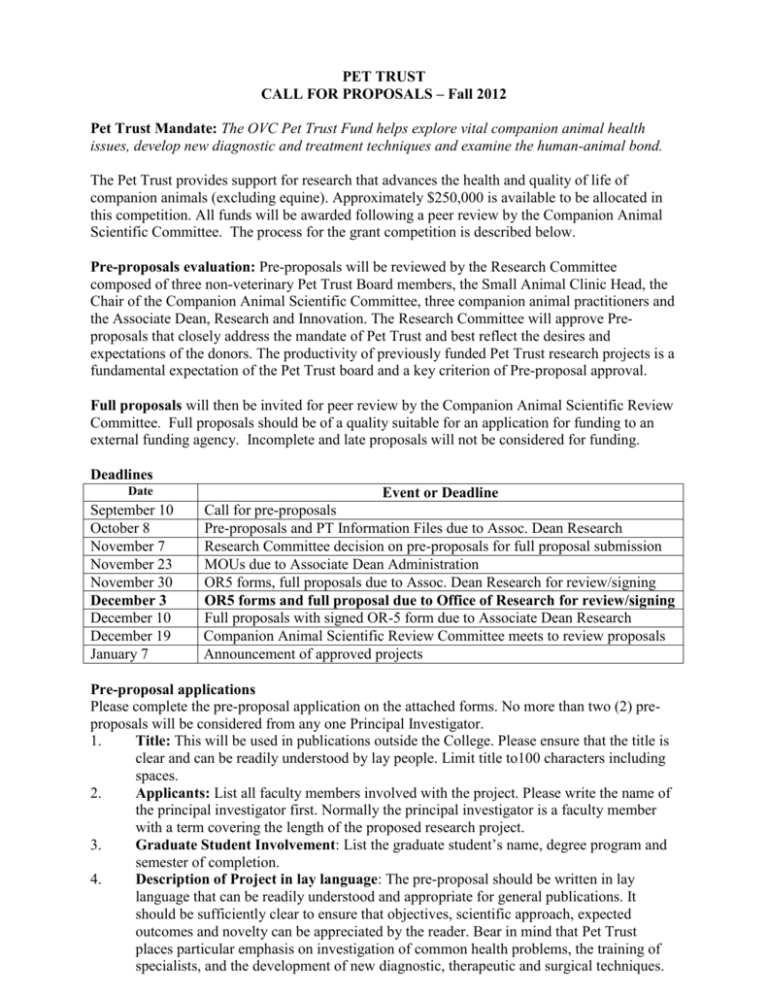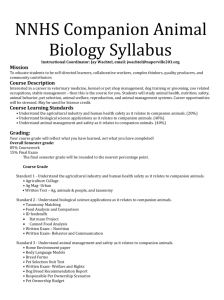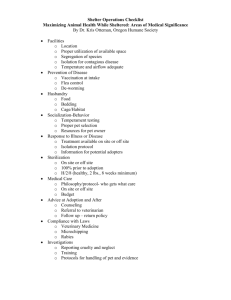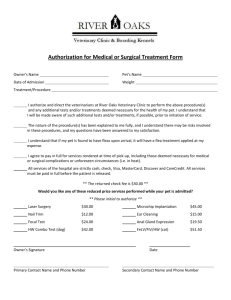PET TRUST - Ontario Veterinary College
advertisement

PET TRUST CALL FOR PROPOSALS – Fall 2012 Pet Trust Mandate: The OVC Pet Trust Fund helps explore vital companion animal health issues, develop new diagnostic and treatment techniques and examine the human-animal bond. The Pet Trust provides support for research that advances the health and quality of life of companion animals (excluding equine). Approximately $250,000 is available to be allocated in this competition. All funds will be awarded following a peer review by the Companion Animal Scientific Committee. The process for the grant competition is described below. Pre-proposals evaluation: Pre-proposals will be reviewed by the Research Committee composed of three non-veterinary Pet Trust Board members, the Small Animal Clinic Head, the Chair of the Companion Animal Scientific Committee, three companion animal practitioners and the Associate Dean, Research and Innovation. The Research Committee will approve Preproposals that closely address the mandate of Pet Trust and best reflect the desires and expectations of the donors. The productivity of previously funded Pet Trust research projects is a fundamental expectation of the Pet Trust board and a key criterion of Pre-proposal approval. Full proposals will then be invited for peer review by the Companion Animal Scientific Review Committee. Full proposals should be of a quality suitable for an application for funding to an external funding agency. Incomplete and late proposals will not be considered for funding. Deadlines Date September 10 October 8 November 7 November 23 November 30 December 3 December 10 December 19 January 7 Event or Deadline Call for pre-proposals Pre-proposals and PT Information Files due to Assoc. Dean Research Research Committee decision on pre-proposals for full proposal submission MOUs due to Associate Dean Administration OR5 forms, full proposals due to Assoc. Dean Research for review/signing OR5 forms and full proposal due to Office of Research for review/signing Full proposals with signed OR-5 form due to Associate Dean Research Companion Animal Scientific Review Committee meets to review proposals Announcement of approved projects Pre-proposal applications Please complete the pre-proposal application on the attached forms. No more than two (2) preproposals will be considered from any one Principal Investigator. 1. Title: This will be used in publications outside the College. Please ensure that the title is clear and can be readily understood by lay people. Limit title to100 characters including spaces. 2. Applicants: List all faculty members involved with the project. Please write the name of the principal investigator first. Normally the principal investigator is a faculty member with a term covering the length of the proposed research project. 3. Graduate Student Involvement: List the graduate student’s name, degree program and semester of completion. 4. Description of Project in lay language: The pre-proposal should be written in lay language that can be readily understood and appropriate for general publications. It should be sufficiently clear to ensure that objectives, scientific approach, expected outcomes and novelty can be appreciated by the reader. Bear in mind that Pet Trust places particular emphasis on investigation of common health problems, the training of specialists, and the development of new diagnostic, therapeutic and surgical techniques. DO NOT EXCEED THE SPACE AVAILABLE. (Font size not less than 10 pt – sizes below this will be rejected) Please Note: Although the pre-proposal committee will not judge the scientific merit of the proposed study, pre-proposals must have adequate detail on the research design and protocol for the committee to assess them with emphasis on the following criteria: 1. Relevance to Pet Trust Important common or emerging health issues and diseases most often resulting in morbidity or mortality Development or improvement of treatment regimes or diagnostic modalities Prevention of important diseases or suffering including behavioural problems affecting the human animal bond Practice management issues particularly related to communication that results in improving companion animal health and enhancing the human-animal bond. 2. Relative Importance to Companion Animals Studies that have potentially profound scientific impact or applicable animal health benefit in relation to the financial investment Studies that are relevant to all companion animals including dogs, cats as well as small domesticated mammals (i.e. “pocket pets”), reptiles, amphibians, avian and fish. Large companion animals i.e. horses, donkeys, mules and llamas etc. are excluded. 3. Ethical Use of Animals Study does not cause disease, injury, pain or distress (except short-term minor pain that can be controlled by analgesia or anesthesia) Study is not terminal and does not include euthanasia of the animal The use of research animals is justified and statistical evidence indicates that the number of research and/or client-owned animals is appropriate and minimally adequate to achieve proposed results (i.e. power analysis was conducted to calculate sample size in consultation with a statistician) The use of client-owned animals is justified and informed consent is to be sought Animal use is humane and consistent with Animal Care Committee guidelines Investigators and staff are qualified to conduct procedures on living animals Additional Information: Collaborative research projects involving clinicians and basic researchers are strongly encouraged. Translational research projects that target practical applications of the knowledge will receive high priority. Evidence of consistent research productivity from previous Pet Trust grants (e.g. research articles that are either published or in press) is a key factor in Pet Trust grant approval. The completed forms should be submitted electronically to Barb Gaudette, bgaudett@uoguelph.ca. Pet Trust Information Files should be included with the Preproposal. OR-5 and MOU forms for use of HSC resources should be submitted with the full application. PET TRUST PRE-PROPOSAL Fall 2012 New Project 1.Title 2. Lay Title 3. Applicants 4. Grad students 5. Description of Project in lay language: 6. Categories: (Check one) Diseases Cancer Infectious Allergy/Immunemediated Metabolic /Genetic Degenerative/Geriatric Molecular Basis of Disease New Project Intervention Anesthesia & Pain Management Therapeutics, Pharmacology & Toxicology Diagnostic Modalities Surgery Health Care Critical Care Preventative Health Nutrition Primary Care Behaviour, human/animal bond and communications Pet2wint.doc Information for the Pet Trust Research (Pre-Proposal) Committee 1. What is the main purpose of the proposed project? (check the correct area/s) a) to address a common problem in non-specialty companion animal practice b) to address a less common but heretofore unresolved disease mechanism, diagnosis, or treatment question in non-specialty companion animal practice c) to address a question/problem of relevance to speciality or referral practice (including species specialization) d) to address a “basic” or more fundamental mechanistic question that has relevance only to companion animal medicine e) to address a “basic” or more fundamental mechanistic question that has relevance to companion animals and also other species, including humans f) to determine whether a recent advance in human medical diagnosis and therapeutics has relevance to companion animal medicine g) Other (Explain) 2. Does the project utilize client animals 3. If the project utilizes research animals, rather than client animals, explain why this is necessary? 4. If the project utilizes research animals, what will happen to the animals after the study, and why was this choice made? 5. If the project utilizes tissue samples or cell culture lines, how will these be obtained? 6. Do you have any additional comments/clarification in relation to the relevance, need for animal use, or possible animal welfare/ethics. If so, add here. , research animals , both , or no animals ?






